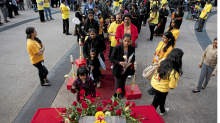 Andrew Mahendrarajah Antonipillai believed he was protected. Family and friends tried to warn him of the danger he faced returning to his native Sri Lanka. But Mr. Antonipillai, a man his Montreal neighbours knew as ready to help anyone in need, shrugged them off, saying his Canadian citizenship would keep him safe. “They can’t do anything to me,” he told friends who cautioned him about his planned travels earlier this year.
Andrew Mahendrarajah Antonipillai believed he was protected. Family and friends tried to warn him of the danger he faced returning to his native Sri Lanka. But Mr. Antonipillai, a man his Montreal neighbours knew as ready to help anyone in need, shrugged them off, saying his Canadian citizenship would keep him safe. “They can’t do anything to me,” he told friends who cautioned him about his planned travels earlier this year.
But in the end, Mr. Antonipillai’s passport proved no shield when he ran into trouble in a former Tamil Tiger enclave in northern Sri Lanka two weeks ago. The Tamil-Canadian was brutally slain in still-unexplained circumstances. His mutilated body was flown home and buried in Montreal on Saturday.
The killing has inflamed tensions on both sides of the divide between Sri Lanka’s two ethnic groups, on the island and in the country’s far-flung diasporas. It paints in stark relief the climate of barely suppressed violence that endures from the country’s bitter civil war. And it serves as a cautionary tale. For while Mr. Antonipillai escaped the war and painstakingly built a new life in Canada, his success as an immigrant did not immunize him from the old violence of his homeland.
Mr. Antonipillai, 53, fled Sri Lanka at the height of the conflict in the late 1980s. He flew back from his Montreal home in January, intent on reclaiming family property that he said had been occupied during the war.
Friends say that his family once owned a few stores and houses in Killinochi, the northern Sri Lankan town that the Liberation Tigers of Tamil Eelam (LTTE) used as their de facto capital until they were defeated by the Sri Lankan army in a final bloody assault three years ago this week.
The property had first been seized by the LTTE, which helped itself to the assets of the people who lived under its control to fund its rebellion.
After the Sri Lankan army took the area in 2009, the military then occupied a huge amount of civilian property and continues to run the majority of businesses in the region. Friends say Mr. Antonipillai’s property was taken too.
Killinochi today buzzes with theories about his death: most Tamils, and many Sri Lankan human-rights groups, believe the military is somehow implicated.
The continuing heavy military presence in northern and eastern Sri Lanka – the areas once controlled by the LTTE – has been sharply criticized by international human rights organizations which have urged the United Nations to examine the government’s “forcible acquisition of land” that is displacing Tamils.
“The military remains in full control of the north and anything that happens there can be considered to happen with the consent and the complicity of the military,” said Ruki Fernando, head of the Law and Society Trust of Sri Lanka and a leading human-rights advocate.
The Sri Lankan military has refused to answer any questions about a possible investigation into Mr. Antonipillai’s murder, he added. There have been no arrests. The Canadian High Commission in Colombo is pressing for an inquiry and has sent a fact-finding team to Killinochi, according to journalists in the area.
“There is an ongoing investigation so we have to wait for their conclusions,” said Chitranganee Wagiswara, the Sri Lankan High Commissioner to Canada, in an interview. She derided what she called “wild allegations” made by “groups sympathetic to the Tamil Tigers” to keep the issue of a Tamil homeland, or Tamil Eelam, alive.
Mr. Antonipillai came to Canada in the first wave of asylum seekers from Sri Lanka. He found work in Montreal as a manager in a furniture factory. He married a fellow Tamil immigrant and they had three children, raising them on Montreal’s West Island. Their community considered them prosperous and well-settled, although Mr. Antonipillai was convicted once of welfare fraud.
(For updates you can share with your friends, follow TNN on Facebook and Twitter )
